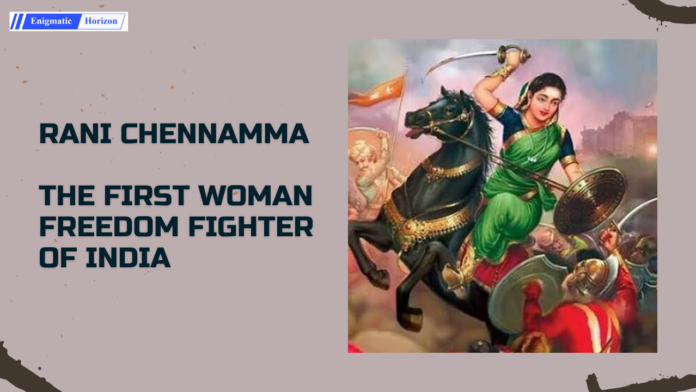Priyal Dholakia- Enigmatic Horizon Staff (Assistant Editor)
“Nimageke kodabeku kappa?” (Why should I pay your tax?)
“Are you my brother, sister, relative, or friend?”
These powerful words were those of Kittur Rani Chennamma of Karnataka, the first queen to fight against the British around 1820.
Kittur Rani Chennamma can be considered the epitome of women’s bravery in India. When we think of female freedom fighters in India, her name stands out with shimmering glory. She has emerged as a true icon for women who continue to fight for their rights even today. Even though she could not win the battle against the British, she has truly immortalized herself through her valiant deeds and brave acts. She definitely did create a revolution in her own way and become an inspiration for women for generations to come.
A glimpse into the life of Kittur Rani Chennamma
Kittur Chennamma was the Indian queen (rani) of Kittur, a princely state in present-day Karnataka, India. She was one of the first female rulers to rebel against British rule; she is a popular folk hero in Karnataka and a symbol of the independence movement in India.
Born into a Lingayat family, she was known for her strong sense of independence and resistance to foreign rule. Chennamma was married to Raja Mallasarja, the ruler of Kittur, at the age of 15. After her husband’s death, she became queen and took charge of the kingdom’s affairs. Chennamma was known for her administrative skills and her ability to maintain law and order in the region.
Rani Chennamma’s fight against the British
In 1824, the British East India Company annexed the nearby kingdom of Belgaum and demanded that Kittur pay a tribute to them. Chennamma refused to accept the British demand and sent a letter to the Governor-General of India, Lord William Bentinck, stating that she would not submit to their authority. She stated that Kittur was an independent state and not a part of British India. The British sent troops to Kittur to enforce their demands, but Chennamma put up a fierce resistance.
Chennamma and her army fought valiantly against the British, using their knowledge of the terrain and guerrilla tactics to gain the upper hand. The British, on the other hand, were ill-equipped to handle the fierce resistance they encountered in Kittur. The conflict continued for several months, during which time Chennamma’s army inflicted heavy losses on the British.
During the battle, Rani Chennamma’s army captured a British officer named Thackeray. Instead of killing him, she treated him with respect and sent him back to the British with a letter that stated her demands for peace. However, the British did not agree to her terms and continued their attack.
The British eventually gained the upper hand in the battle and captured Chennamma and her associates. She was imprisoned in Bailhongal Fort, where she spent the rest of her life. Despite her defeat, Chennamma’s bravery and courage inspired many people to take up the fight against British rule.
Rani Chennamma’s legacy lives on.
Today, Kittur Rani Chennamma is remembered as a symbol of resistance against British imperialism. Her legacy continues to inspire people, especially women, to fight for their rights and stand up against oppression.
In recognition of her contribution to the freedom struggle, the Government of India issued a stamp in her honor in 2009. In addition, the Kittur Rani Chennamma Memorial Government Museum was established in Kittur to commemorate her life and achievements. A train connecting Bangalore to Kolhapur is named Rani Chennamma Express in her memory.
The greatest homage one can pay to such forgotten icons is to raise awareness of them. It is essential to acknowledge the contributions of such unsung heroes whose sacrifices have been forgotten with time. There are several such unlauded warriors who have shed their blood for the cause of Indian Swaraj (independence). As time goes by, it is crucial to delve into history, discover the names of such fighters who may have been overlooked, and bring their stories to the forefront. Only by doing so can we truly appreciate the magnitude of their sacrifices and learn from their experiences.
